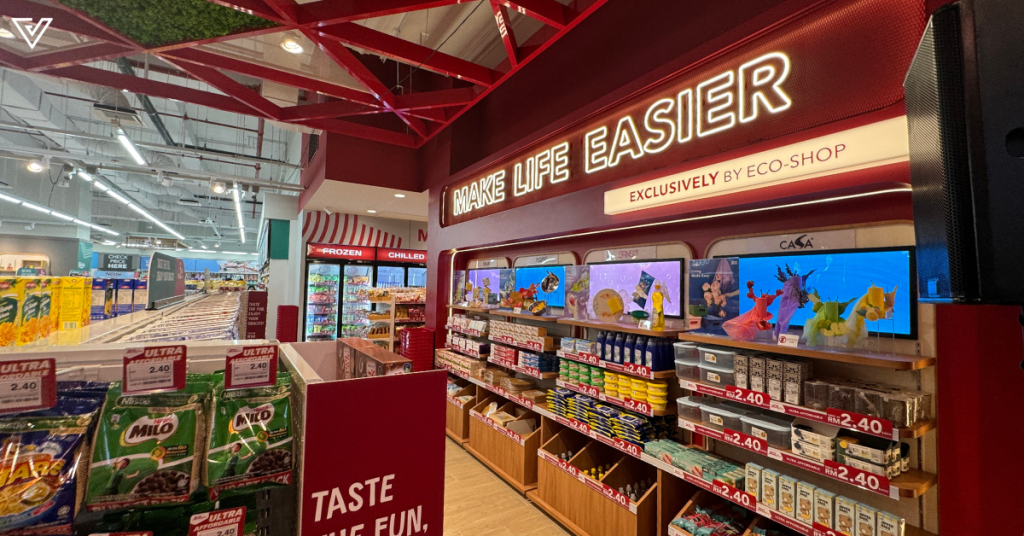Growing a business to 300 outlets is nothing short of an incredible feat. And that milestone is something that homegrown retail chain Eco-shop has just achieved with their new concept store in Nu Sentral.
At the launch of its new outlet, we got to chat with Eco-shop’s CEO, Jessica Ng. She joined the company May of last year as the COO before stepping up as the CEO in October 2023.
But the history of the homegrown brand goes way back before her career there.
Eco-shop got its start 21 years ago when founder Dato’ Sri Lee Kar Whatt established the first outlet in Jementah, Johor.

With a motto of “make life easier”, Eco-shop exists to provide ultra-affordable options for consumers, from daily essentials like detergent and tissue papers to lifestyle products such as toys.
And all of this is offered at the low, standardised price of RM2.40.
Moving into the cities
Interestingly, even though the business has an impressive store count of 300 outlets, I was surprised to learn that some of my friends have never heard of the store.
This might be because of Eco-shop’s target market, and the fact that they’ve been focusing more so on rural areas, compared to the city centre.
“The store’s business objective is to support the daily life of B40 customer base,” Jessica pointed out. “And as we grow, we’re moving more into corporatisation, we do feel that there’s a lot of opportunity to revamp the store and bring it into the city centre.”
Jessica herself shared that the brand awareness for Eco-shop indeed is on the lower end in the city, but that’s something that they aim to change.
After all, many in the city also need affordable options nowadays. And the Nu Sentral location speaks to that. Being connected with KL Sentral, this mall sees huge volumes of foot traffic every day from commuters as well as tourists.
Moving forward, Eco-shop does plan to put more effort into opening up in city areas, though the majority of their stores will still be based in residential areas.
“We’re very cautious, we will look at the fixed costs, the rental that we can afford, so there is a certain benchmark of rentals that we look at,” Jessica said about their strategy towards opening more outlets.
Through store mapping exercises, the Eco-shop team aims to open up in “green areas”, which are regions whereby they do not have a presence.
Keeping prices low
Even amidst rising costs of living, Eco-shop has been able to keep its prices low, even though the RM2.40 price has been increased from RM2.20 in the past few years.
So, how are they able to do that while still sustaining and growing their business?
“I think it comes back to the totality of the value management, the value chain management,” Jessica said.
To start, Eco-shop is based outside of the city centre, including its HQ and warehouse. This helps to keep some of the overhead down.
With 300 stores, the business is able to achieve economies of scale, buying things in large quantities, which means the cost is lower per product.
On top of that, Eco-shop also breaks down certain bulk products into smaller portions and puts them into their own packaging, so the customer can afford it.
For example, while shopping for instant coffee, I noticed that they were selling instant coffee sachets in packs of just two or three, which isn’t a bad deal at all if that’s what you can afford.
As Jessica said, it comes down to “the discipline of the management, how we drive the cost efficiency, and the collaboration with the supplier”.
Eco-shop has also developed their own in-house brands, such as their own stationery line and even tissue line. They do this by going directly to the factory and working with them to customise products.
And going down the value chain, the company also has their own delivery fleet.
“Every component that is integrated in the company is created in a way that it needs to drive value,” Jessica reasoned.
Moving forward, Eco-shop aims to continue working with local suppliers as well as support SMEs who may have relevant products.
Still plenty of room to grow
Speaking to Jessica, it’s clear that Eco-shop is very positive about their future in the Klang Valley.
“I think there are many, many shops that we can open,” the CEO said.
But instead of just blindly opening more outlets, they must ensure that they have the resources to support those stores, especially when it comes to labour.
“Many times, retailers grow very fast but you don’t have the manpower in place. So, for us, we set up around seven satellite training centres to groom the storefront people,” Jessica said. “That will help us support another 50 to 60 stores in a year.”
With how much Eco-shop has grown, I wondered whether they would be setting their sights abroad in the near future.
“At this moment, I think Malaysia still has a lot of room for growth,” she said. “There’s still a lot of places for us to open stores, so we would like to be more focused and do a very good foundation in Malaysia.”
Featured Image Credit: Vulcan Post